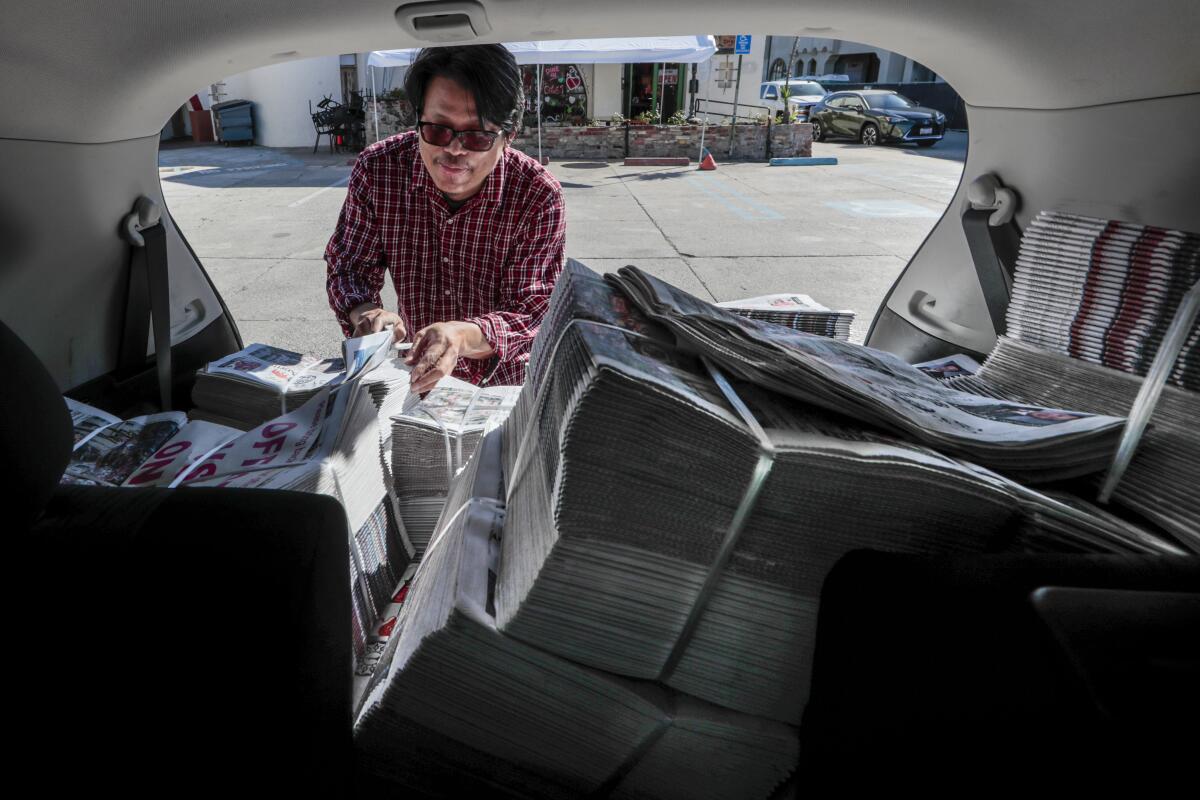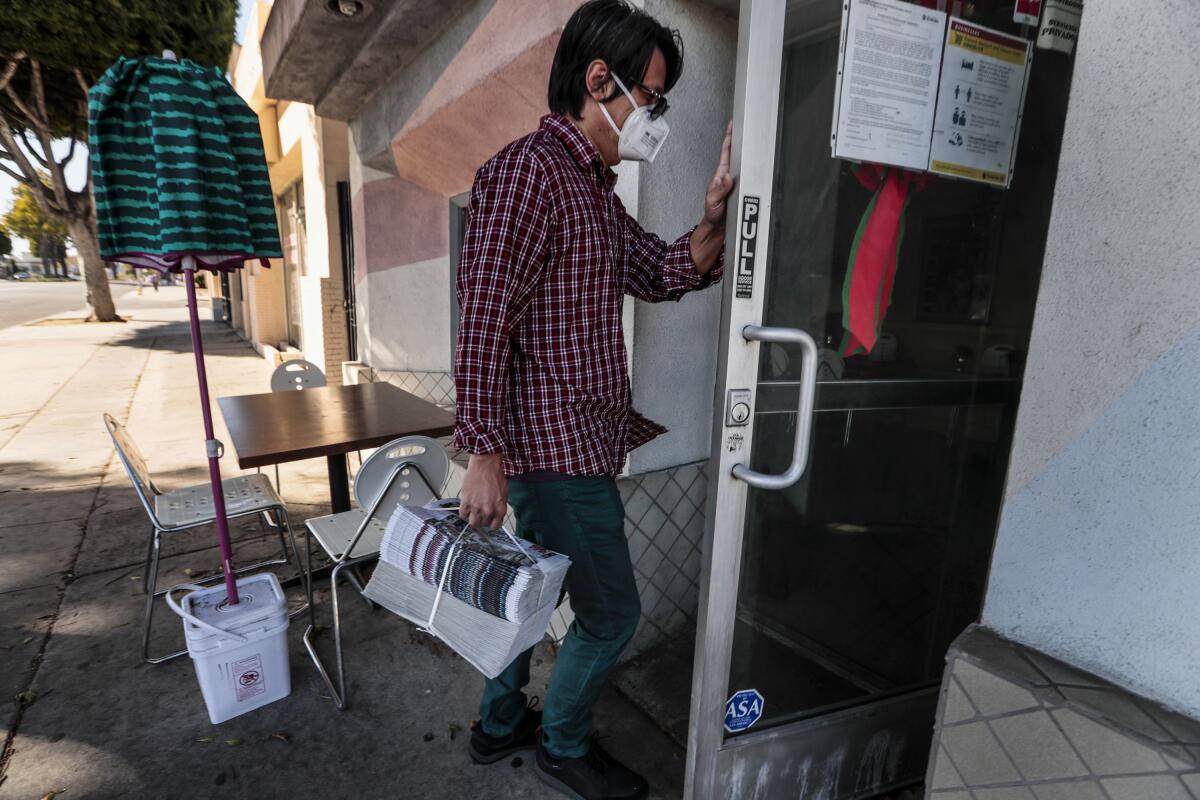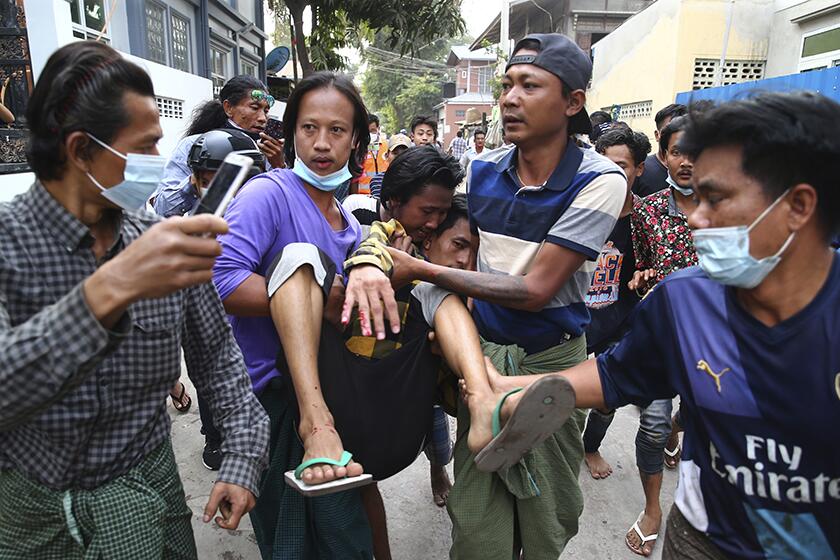From a tiny desk, newspaper editor opens window to chaotic Myanmar

- Share via
At a tiny desk in his Canoga Park home, over a week after a military coup in his native country, Thakhin Kai Bwor was putting together the latest edition of the Myanmar Gazette.
In one dispatch, Burmese Americans around the U.S. protested the coup and demanded the release of elected leader Aung San Suu Kyi. Also on the front page of the February issue was a first-person account of getting the COVID-19 vaccine.
Bwor edits and lays out the 32-page monthly newspaper, written in the curlicued script of Burmese, a tonal language in the same Sino-Tibetan family as Chinese.
He delivers it too, crisscrossing L.A. County for two days to drop off newly minted editions at dental clinics, real estate offices and Buddhist temples — about 3,000 copies in all, with thousands more mailed to Arizona, New York and Fort Wayne, Ind., where there are large Burmese communities. More readers download the paper by email.
The Myanmar Gazette, which Bwor founded almost 15 years ago, is the only Burmese-language newspaper in the United States, providing a window into a country beset by the Feb. 1 coup and bloody military crackdown for an immigrant community of about 300,000 nationwide.
Just as vitally, the Gazette, like many ethnic newspapers, is a how-to guide for life in the U.S.

With the twin crises of the coup and the coronavirus, Burmese immigrants in the U.S. want on-the-ground dispatches from Myanmar in their native language, as well as advice on masking, social distancing and vaccines.
The paper is free, supported by advertising from mostly Burmese-owned businesses. Bwor, 53, has a day job as a web IT specialist.
Late at night, he works on the publication with his wife, who contributes articles, including the first-person on getting vaccinated, when not working as a licensed pharmacy technician.
Bwor’s wife writes under the pen name Saung Oo Pan, which means “early winter flower.” She did not want her legal name published because she has family in Myanmar and worries about retribution from the Burmese government.
Family members have scolded them for wasting time on a “hobby” that brings in little income. Their daughter, who is in junior high, has learned to balance her parents’ dual occupations.
Bwor knows what it is like to live under martial law and for his work as a journalist to be censored by the government. Both fuel his determination to bring the news to his community.
The Myanmar Gazette is unabashedly on the side of the anti-military protesters, as are many Burmese immigrants. Pan penned a poem, “Moe Khaw Thu,” or “Praying for the Rain,” dedicated to protesters fighting for democracy, that ran inside the February issue.

“Nothing prepares us for a crisis like this. That is how the news happens,” Bwor said of the coup in Myanmar, also known as Burma. “I try to make sense from it and to give Burmese an inside knowledge.”
About a third of Burmese Americans live in California, with a large concentration in the San Gabriel Valley. The small community is anchored by a cluster of restaurants and Buddhist temples.
Before the pandemic, Bwor’s delivery rounds included Northern California and Arizona. Now, readers in those areas peruse electronic copies. The paper has a vital Facebook presence yet its website is unsteady, prone to hackers, he said.
He relies on about a dozen freelancers in Myanmar, as well as a network of old friends and colleagues, to keep tabs on events there.
As clashes between soldiers and protesters on the streets of Yangon have grown increasingly violent, the government has restricted internet access, shut down media outlets and detained dozens of journalists.
But despite daily internet blackouts, cellphone videos and photos of military and police brutality are emerging daily from Myanmar.
Soldiers have been shooting at crowds of protesters and roaming the streets indiscriminately firing their weapons, leaving more than 60 people dead.
More than 2,000 people have been arrested, many in their homes, in a bid to quash resistance to the junta. Two Myanmar officials have died in custody.
Suu Kyi became an icon of democracy while under house arrest for nearly 15 years, winning the Nobel Peace Prize. After her release, she rose to be Myanmar’s nominal leader in 2015 and heads a political party that has won two consecutive landslide victories in parliamentary elections, most recently in November.
But she has been condemned internationally for her support of the military’s slaughter of Rohingya Muslims in 2017. Now, she is a political prisoner again.
Many journalists are trying to cover the unrest while eluding police at the same time, said Christina Fink, professor of international affairs at George Washington University and an expert in Myanmar. Hiding places are scarce, with the implementation of colonial-era law requiring households to register overnight guests with local authorities.
“Information is a commodity so valuable in a country that’s isolated,” Fink said.
Earlier this week, according to the Associated Press, the government canceled the media licenses of five outlets that had been covering the protests, often with livestreaming video.
Burmese immigrants can turn to CNN and other TV stations for basic updates about their homeland.
But they also “need stories coming from our own people. We need more of our voices,” said Kyaw Than, owner of Jasmine Market Deli, a Burmese Indian restaurant in Culver City.
Than, 37, who has read the Myanmar Gazette for 14 years, called Bwor a type of “community uncle, someone who knows a good lawyer or broker to recommend,” “someone who goes everywhere to capture our lives.”
Bwor was one of the few journalists who showed up when local Burmese rallied outside the federal building in West L.A. to protest against the coup and demand the release of Suu Kyi and other jailed civilian leaders, Than said.
Last year, Bwor wrote a story detailing how Burmese households should fill out U.S. census forms so they are accurately counted and receive their share of government services.
Since the pandemic began, Pan has attended virtual Los Angeles County Department of Health briefings about the coronavirus.
In the heavily immigrant county, Spanish, Armenian, Korean and Mandarin interpreters are sometimes available at the briefings — but not for languages such as Burmese with fewer speakers, making Pan a vital conduit.
In the February issue, Pan published an interview with a political strategist, Miemie Winn Byrd, from Hawaii’s East-West Center, who compared the code of conduct in the Burmese Army with the U.S. Army, providing context for the coup.
Soldiers in Myanmar are often trained to protect a specialty group, perceived as the elites, in contrast to American soldiers whose mission is to protect the population at large and uphold the U.S. Constitution, the strategist said.
“There’s never enough time to read everything or write everything, but I have loved reading and writing since childhood, and we are determined to keep up with the newspaper,” said Pan, 43, who graduated from medical school in Myanmar.
Like many Burmese, Bwor arrived in the United States as a refugee, joining his two brothers in 2001. He declined to speak about why he left Myanmar, concerned that family members there might be targeted due to his coverage of anti-government protests.
Bwor and Pan met through a mutual friend and married in California in 2010.
From 2000 to 2019, Burmese made up the largest nationality among refugees admitted to the U.S.
Most Burmese came to the U.S. because the military’s brutal tactics and restrictions on free speech made it difficult to live a safe and free life in Myanmar, Fink said. It was also hard to make a living there because of the poor economy, she said.
For Bwor, Aug. 8, 1988, remains a pivotal moment.
As a mechanical engineering student at the Rangoon Institute of Technology, he had been participating in anti-government protests over the struggling economy and restrictions on personal freedoms.
On Aug. 8, thousands of people marched in the streets of Rangoon, now also known as Yangon, calling for democracy. Bwor eagerly joined the protesters. The government responded by appointing a new military leader, imposing martial law and banning public demonstrations.
In his homeland, Bwor wrote for lifestyle magazines. After coming to the U.S., he edited a magazine called the Yangon Walker. Because it was published in Myanmar, he had to submit the stories to government censors.
Then, in July 2006, he started the Myanmar Gazette.
With the latest coup, Bwor said, “we fear history is repeating itself.”
Noelene Kao, who served as treasurer of the Southern California Burmese Assn., said the Gazette is a valuable resource, and the Burmese community should be mindful of Bwor’s and Pan’s dedication.
“I appreciate their sacrifices in starting a newspaper,” said Kao, 59, who came to the U.S. in 1980 to attend college.
She flips through the Gazette’s pages, searching for traditional recipes. Pre-pandemic, ads in the paper guided her to Burmese restaurants when she traveled to cities such as San Francisco and New York.
Dentist Myi Nyi Win, who depends on Facebook and the Gazette to stay updated on happenings in Myanmar, said Burmese immigrants need reliable sources of information, especially if they want to track or influence events back home.
He longs for a time when “my motherland can have the same freedom as we’re experiencing here.”
More to Read
Sign up for Essential California
The most important California stories and recommendations in your inbox every morning.
You may occasionally receive promotional content from the Los Angeles Times.















